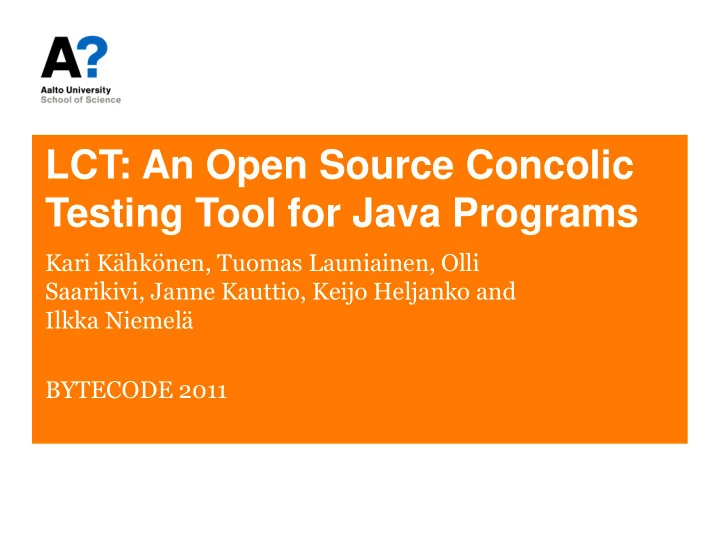

LCT: An Open Source Concolic Testing Tool for Java Programs Kari Kähkönen, Tuomas Launiainen, Olli Saarikivi, Janne Kauttio, Keijo Heljanko and Ilkka Niemelä BYTECODE 2011
Overview • Concolic Testing • Tool Overview • Experiments • Tool Demonstration
Concolic Testing • Concolic testing (dynamic symbolic execution) is an automated testing method – Generate test inputs – Execute program with these inputs – Catch runtime errors (uncaught exceptions, assertion violations) • Can we cover all the reachable statements with the tests? – E.g., random testing can have a very low probability on reaching certain statements – Concolic testing: Attempt to explore all feasible execution paths
Concolic Testing • Concolic testing combines concrete and symbolic execution – Program is instrumented with additional statements to enable symbolic execution – Concrete execution guarantees that all the found bugs are real • Symbolic execution collects path constraints that can be used to compute new test inputs that explore previously unexplored execution paths • Path constraint are typically solved using SMT-solvers
Example int x = input(); Input <= 10 Input > 10 if (x > 10) { x = x + 5; if (x == 50) error; Input + 5 != 50 Input + 5 == 50 } ERROR Path constraint is a conjunction of constraints along a path from root of the tree to a leaf node
LCT – LIME Concolic Tester • An open source concolic testing tool for sequential Java programs • Instruments the program under test using Soot • Uses Boolector for bit-precise constraint solving – For example, overflows and modulo-operator are handled precisely • Supports distributed testing by allowing several tests to be executed in parallel • Reports uncaught exceptions as errors • Several related tools exists: CUTE/jCUTE, Pex, Klee ,…
Tool Architecture
Distributed Testing • Concolic testing suffers from path explosion problem • Testing separate execution paths can be done independently – Keep track of all the unexplored branched in the execution tree – Distribute the path constraints related to these branches to test executors – Solving path constraints centrally could cause a performance bottleneck • Distributed testing allows taking advantage of multicore architectures and networks of computers
Limitations • Java core classes can be problematic to instrument directly – LCT replaces some of the core classes with custom implemented counterparts that can be instrumented • If the program under test contains un-instrumented classes, full path coverage cannot be guaranteed • Floating point input values are not supported as the constraint solver does not support floating points • LCT makes a non-alising assumption – A[i] = 0; A[j] = 1; if (A[i] != 0) ERROR;
Experiments Benchmark Paths 1 executor 10 executors 20 executors AVL tree 3840 16m 57s 2m 6s / 8.1 1m 8s / 15.0 Quicksort (5) 514 3m 11s 21s / 5.2 13s / 8.4 Quicksort (6) 4683 28m 22s 3m 29s / 8.1 1m 39s / 17.2 GCD 2070 11m 12s 1m 13s / 9.2 38s / 17.7 • The distributed nature of LCT has been evaluated by testing Java programs with varying number of test executors running concurrently
Experiments Approach 1-bounded 2-bounded 3-bounded Decoupled 121 (54.50%) 185 (83.33%) 221 (99.95%) Coupled 123 (55.41%) 187 (84.23%) 221 (99.95%) Random 95 (42.79%) 151 (68.02%) 184 (82.88%) • LCT has been used in a case study to compare random testing and concolic testing (SPIN 2010) • Here LCT was used on a large number of mutants of a Java Card application to discover if the mutations changed the behavior of the program
Future Work • We are currently extending LCT to support testing of multi-threaded Java programs – Support for multi-threaded programs will be released soon in LCT 2.0 • Support for C language based on the LLVM compiler infrastructure is also in development • We are investigating how to support incremental testing by exploring only execution paths affected by recent changes
Availability • LCT is open source and available from http://www.tcs.hut.fi/Software/lime
Recommend
More recommend